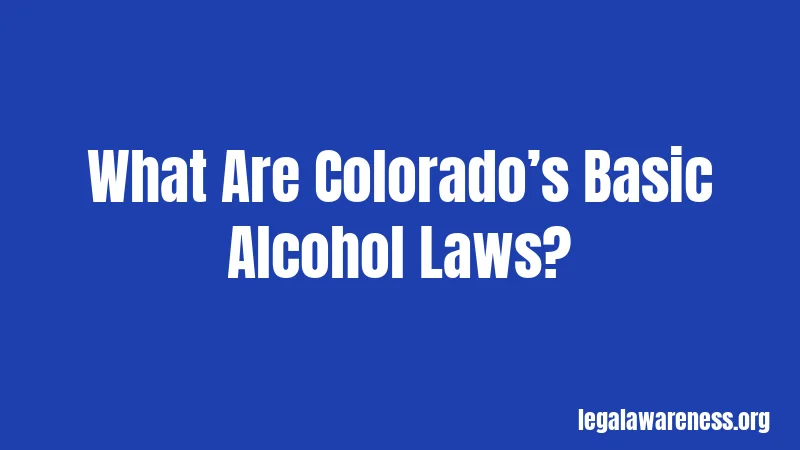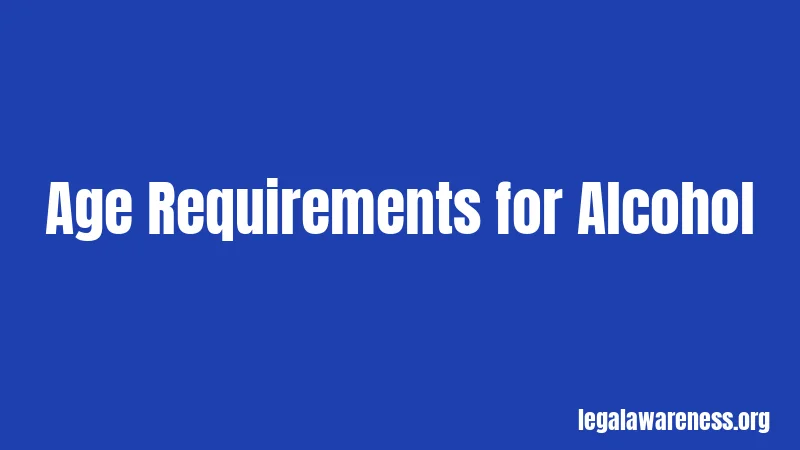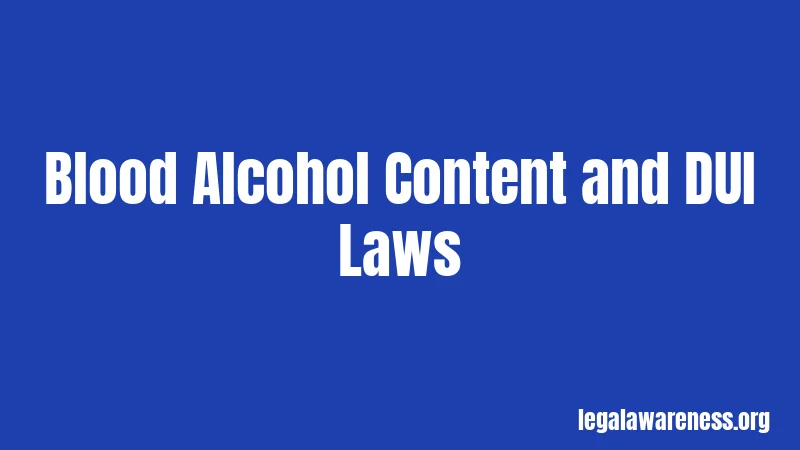Colorado Alcohol Laws (2026): Everything You Need to Know
Colorado has specific rules about buying, selling, and drinking alcohol. These laws changed recently with new legislation in this year. Understanding these rules helps you avoid legal trouble and stay safe.
This article covers all the current Colorado alcohol laws. You’ll learn about buying restrictions, drinking age limits, and penalties for violations.
What Are Colorado’s Basic Alcohol Laws?

Colorado allows the sale of beer, wine, and spirits throughout the state. The Colorado Liquor Enforcement Division controls all alcohol sales and licensing.
Colorado uses a three-tier system. Manufacturers make alcohol. Wholesalers sell it to retailers. Retailers sell it to customers.
All businesses that make, distribute, sell, or import alcohol must have a license from the state. The rules apply to bars, restaurants, liquor stores, grocery stores, and breweries.
Where You Can Buy Alcohol in Colorado
Liquor Stores and Package Stores
Liquor stores can sell beer, wine, and spirits every day from 8 a.m. to midnight. These stores have the most complete selection of alcoholic beverages.
You can buy alcohol in single cans, 6-packs, or 12-packs at liquor stores. Some stores offer delivery services if they have proper licensing.
Grocery Stores
Grocery stores sell beer every day from 8 a.m. to midnight. Since 2019, grocery stores can sell full-strength beer. Since 2023, grocery stores can also sell wine.
Grocery stores can only sell beer in 6-packs or 12-packs in bottles or cans. They cannot sell individual cans or spirits like liquor stores.
Gas Stations and Convenience Stores
Gas stations sell beer from 8 a.m. to midnight every day. They follow the same rules as grocery stores for beer sales only.
Bars and Restaurants
Bars and restaurants can serve alcohol from 7 a.m. to 2 a.m. every day. All bars must close by 2 a.m. and provide food or snacks after 8 p.m. if they serve alcohol.
Restaurants can permanently sell cocktails to-go as of 2024. This law became permanent after starting during the COVID-19 pandemic.
Age Requirements for Alcohol

Legal Drinking Age
You must be 21 years old to drink alcohol in Colorado. This applies everywhere in the state.
Minors can drink beer with their parents or legal guardians under specific circumstances. This exception only applies in private settings with direct parental supervision.
Working Age Requirements
You must be 18 years old to serve alcohol in restaurants or bars. Bartenders who handle open containers must be 21 years old.
You must be 21 to work in a liquor store. This rule helps prevent underage access to alcohol.
Recent Law Changes in 2024-2025
SB24-231 Major Updates
Senate Bill 24-231 became law in 2024 and changed many alcohol regulations. The new rules took effect January 1, 2025.
License holders can now renew their permits every two years instead of annually. This change reduces paperwork and costs for businesses.
Licensed retailers can now sell alcohol on Christmas Day. Previously, Christmas sales were prohibited.
Alcohol retailers can conduct tastings and educational classes starting at 10 a.m. These events help customers learn about different products.
Grocery Store Restrictions
Governor Polis signed Senate Bill 33 in April 2025 to halt expansion of hard liquor sales in grocery stores. Currently, only 36 grocery and big-box stores can sell hard liquor.
The law was meant to protect small liquor stores from further economic decline. Competition from grocery stores selling beer and wine has hurt independent retailers.
Takeout Alcohol Made Permanent
Colorado permanently allows restaurants to sell cocktails to-go starting in 2024. The temporary pandemic rule was set to expire July 1, 2025, but is now permanent.
Blood Alcohol Content and DUI Laws

Legal BAC Limits
The legal blood alcohol content (BAC) limit for DUI is 0.08%. This applies to all drivers 21 and older.
Colorado also has a lower limit of 0.05% BAC for Driving While Ability Impaired (DWAI). You can be charged even if you don’t seem drunk.
Drivers under 21 face charges with a BAC of 0.02% or higher. This reflects Colorado’s zero tolerance policy for underage drinking and driving.
Commercial Driver Rules
Commercial drivers cannot have a BAC over 0.04%. CDL holders face automatic license suspension for alcohol violations.
Marijuana and Driving
Colorado sets a limit of 5 nanograms of THC per milliliter of blood. You can still face charges below this limit if you show signs of impairment.
Penalties for DUI and Alcohol Violations
First DUI Offense
A first DUI includes 5 days to 1 year in jail and fines of $600 to $1,000. You must also complete 48 to 96 hours of community service.
License suspension lasts 9 months for first offenses. You may qualify for a restricted license with an ignition interlock device after 30 days.
Repeat Offenses
Second DUI convictions require 10 days to 1 year in jail and up to $1,500 in fines. License suspension increases to one year.
Third DUI convictions require a minimum 60 days in jail and up to 2 years license suspension. A fourth DUI becomes a class 4 felony with possible prison time.
High BAC Penalties
If your BAC is 0.15% or higher, you’re classified as a persistent drunk driver. BAC of 0.20% or higher requires mandatory jail time of at least 10 days.
Underage Drinking and Driving
First underage drinking and driving results in 3-month license revocation, $100 fine, and 24 hours community service. You must also complete drug and alcohol education classes.
Open Container Laws
Vehicle Restrictions
Having open alcohol containers in a motor vehicle is illegal. It’s also illegal to consume alcohol in a motor vehicle.
Previously opened bottles must be stored in a car’s trunk. Unopened containers must be in an area not readily accessible to the driver or passengers.
Public Consumption
Colorado prohibits open containers of alcohol in public spaces. There are exceptions for specific areas like designated entertainment districts.
Having open containers outside licensed premises or private residences is illegal. Violations can result in Class A traffic infractions.
Special Circumstances and Exceptions
Delivery Services
Licensed stores can provide alcohol delivery services. They must follow specific rules about age verification and delivery areas.
Takeout alcohol has limits of two 750ml bottles of wine, two six-packs of beer, or one liter of spirits per transaction. Each purchaser must have their age verified.
Breweries and Distilleries
Breweries and distilleries can operate two manufacturing facilities within 10 miles under one license. Distillery sales rooms can combine beverages with their products to make cocktails.
Sunday Sales
Colorado allows alcohol sales on Sundays with no special restrictions. Retailers can sell from 8 a.m. to midnight on Sundays, same as other days.
How to Stay Legal and Safe
Know Your Limits
Plan ahead if you’re going to drink alcohol. Arrange for a designated driver, taxi, or ride-sharing service. Don’t rely on guessing your blood alcohol level.
Use technology like smartphone apps that estimate BAC. Remember these are only estimates. Always err on the side of caution.
Check Local Rules
Some cities and counties may have stricter rules than state law. Contact local authorities if you’re unsure about specific restrictions in your area.
Business owners should consult with attorneys if they have questions about licensing or compliance. Violations can result in license suspension or criminal charges.
Report Violations
Both state investigators and local law enforcement can investigate liquor law violations. Report illegal sales to minors or other violations to protect your community.
Enforcement and Compliance
Criminal vs. Administrative Penalties
Individuals typically face criminal charges for alcohol law violations. Licensed businesses face administrative sanctions like license suspension.
Most alcohol violations are class II petty offenses up to class II misdemeanors. Only one felony provision exists – when licensees permit illegal gambling on premises.
Compliance Checks
Local authorities regularly send underage cadets into retail establishments to test compliance. These sting operations use expired, underage, or mismatched identification cards.
Businesses must train staff to properly check identification. Failure to verify age can result in serious penalties including license suspension.
Frequently Asked Questions
Can I buy alcohol on Christmas in Colorado?
Yes, licensed retailers can sell alcohol on Christmas Day as of 2025. This changed with recent legislation.
What time do bars close in Colorado?
All bars must close by 2 a.m. every day. They can reopen at 7 a.m. for on-premise sales.
Can grocery stores sell hard liquor in Colorado?
No, grocery stores cannot sell hard liquor except for 36 specially licensed stores. A 2025 law halted further expansion of liquor sales in grocery stores.
Is it legal for minors to drink with parents in Colorado?
Yes, minors can drink with parents or legal guardians in specific private circumstances. This exception requires direct parental supervision.
What’s the penalty for refusing a breath test?
Refusing chemical testing results in 1 to 3 years of license revocation depending on your record. If your BAC is 0.15% or higher, you’re classified as a persistent drunk driver even on first offense.
Final Thoughts
Colorado’s alcohol laws balance personal freedom with public safety. The state allows reasonable access to alcohol while maintaining strict penalties for violations.
Recent changes in 2024 and 2025 have modernized many rules. Businesses can now renew licenses every two years instead of annually. Restaurants can permanently sell takeout alcohol.
Remember that alcohol laws can change. Stay informed about current regulations to avoid legal problems. When in doubt, choose the safer option and don’t drink and drive.
